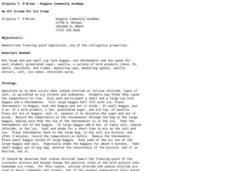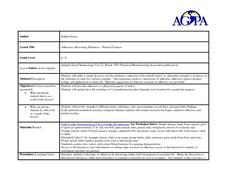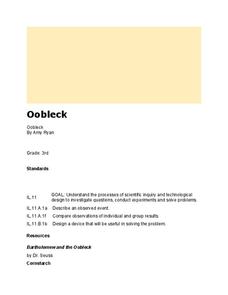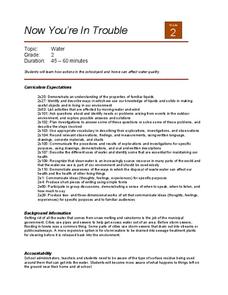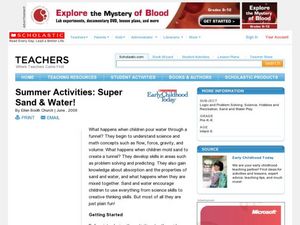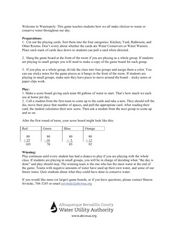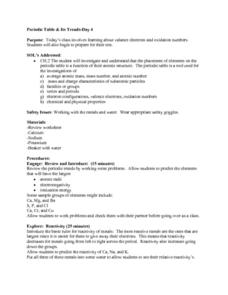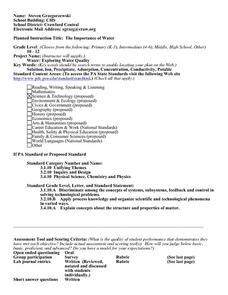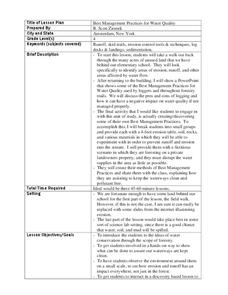Curated OER
Oceanography: Density: Designing a Hydrometer Lab
Middle schoolers explore water density and design a hydrometer to measure density. This activity is part of Ocean World's home site and excellent resources and links are provided.
Curated OER
An Underground River
Seventh graders describe how water flows through the ground, what an aquifer is and what soil properties are used to predict groundwater flow. They consider the affects of pollution on groundwater supplies and write a letter drawing...
Curated OER
We All Scream for Ice Cream
Students investigate the freezing point depression of water while making ice cream. In this colligative properties lesson plan, students make ice cream using ice, salt and water to freeze milk and sugar. They measure the temperature of...
Curated OER
One World Ocean
Students compare and contrast the properties of salt water in the oceans/seas and freshwater elsewhere on the planet. They also analyze mixing caused by currents in the ocean, including the effects of warm and cold water as well as with...
Curated OER
Change It
Fourth graders expand their knowledge about how the physical properties of a substances can be changed. They are given multiple opportunities, using first-hand experiences and familiar objects in different contexts, to identify...
Curated OER
Adhesives: Measuring Stickiness
Students test the stickiness of natural substances. In this adhesion as a property of matter instructional activity, students build a tool to test the adhesion of natural "glues" such as honey, peanut butter, flour and water paste, and...
Curated OER
The Scientific Method Using Mystery Powders
Students use the scientific method to determine physical and chemical properties of unknown substances. In this scientific method lesson plan, students discuss chemical and physical properties of substances as a class after a...
Curated OER
Pass the Jug
Students discuss water rights. In this science lesson, students simulate an exercise whereby they begin to understand the meaning of water allocation and limited water supplies by actually passing out water from a jug.
Curated OER
Oobleck
Students explore "matter." In this literacy and three states of matter lesson, students listen to Bartholomew and the Oobleck by Dr. Seuss, then work in groups to explore "oobleck" (cornstarch and water mixture) with their five senses....
Curated OER
To Float or Not to Float, That is the Question?
Ninth graders develop operational definition of density, do computations using density equation, categorize pieces of matter as being able to float on
water or not, based on density, explain why some objects sink or float based on...
Curated OER
Now You're In Trouble
Second graders study how actions in the schoolyard and home can affect water quality. They discuss how rainwater can clean plants and sidewalks on its way to storm sewers. They draw an example of a simple maze that represents the maze...
Curated OER
Summer Activities: Super Sand & Water!
Young scholars use funnels and create tunnels. In this early childhood lesson plan, students begin to understand science and math concepts such as flow, force, gravity, and volume and develop skills in areas such as problem solving and...
Curated OER
Wateropoly: Life in the Desert
Students explore water properties by participating in a drought related board game. In this water conservation lesson, students play a game titled "wateropoly" which is based on the classic board game Monopoly. Students utilize cards and...
Curated OER
Making Cents of Density
Middle schoolers utilize their knowledge of the physical properties of matter such as mass, volume, and density to solve a problem. They utilize the scientific method to solve a problem. Pupils analyze their data to determine whether...
Curated OER
Changes in Nature
Fifth graders identify the chemical and physical changes in the water cycle, carbon cycle, and the effects of weathering. They analyze the periodic table, and observe how vinegar reacts with limestone in a chemical reaction that causes...
Curated OER
Air Is there
Learners experiment to observe air and its mass. In this air lesson, students use the scientific method to complete experiments that demonstrate the properties of air. Learners view a video as follow-up.
Curated OER
Is the Hudson River Too Salty to Drink?
Students explore reasons for varied salinity in bodies of water. In this geographical inquiry lesson, students use a variety of visual and written information including maps, data tables, and graphs, to form a hypothesis as to why the...
Curated OER
Gas Laws and Alka-Seltzer Rockets
Students investigate the Ideal Gas Law. For this three states of matter lesson, students create Alka-Seltzer rockets using film canisters. Students record observations and data according to the scientific method and explain the gas...
Curated OER
Periodic Table And Its Trends - Day 4
Guide your chemistry class through the periodic table so that they are able to identify atomic radii, electronegativity, and ionization energy. Give them three metals to place in water to observe reactivity. Teach them to write electron...
Curated OER
The Importance of Water
Students explore the importance of water. They discuss why water is important and students design an experiment that evaluates the water quality and methods of improving water quality. Students perform testing and report their findings.
Curated OER
Why Do Ice Cubes Melt?
First graders investigate water properties by participating in a hands on experiment. In this ice formation lesson plan, 1st graders examine real ice cubes in a bowl and identify the reasons why certain cubes melt faster than others....
Curated OER
Slippery, Slippery Ice
Students investigate how salt affects ice by experimenting in class. In this water properties instructional activity, students utilize a penny, salt and pans of ice to examine the sliding ability of a penny across a layer of ice....
Curated OER
Best Management Practices for Water Quality
Fourth graders examine best management practices for water quality. In this water quality instructional activity, 4th graders explore unused land to identify areas of runoff, erosion, and effects of water flow. Students discuss logging...
NASA
States of Matter
Water, one of the basic needs of humans, is found in all three states of matter on Earth; no other planet—that we know of—possesses this quality. Here is a unit that allows learners to explore through experimentation what it takes to...
Other popular searches
- Water Properties
- Chemical Properties of Water
- Physical Properties of Water
- Properties of Water Salinity
- Science Properties of Water
- Properties of Water Labs
- Water Chemistry Properties
- The Properties of Water
- Three Properties of Water
- Water Science Properties
- Properties Water Evaporation
- Water +Science +Properties




